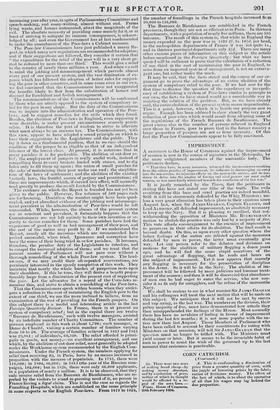IMPRESSMENT.
A PETITION to the House of Commons against the impressment of seamen is now in the course of signature in the Metropolis, by the more enlightened members of the mercantile body. The petitioners declare, " That they have, in many instances, witnessed the inconveniences resulting from the odious practice of impressment, its influence in discouraging an entry into the sea-service, its injurious effects on the mercantile service, and its ten- dency to drive into the employ of foreign and rival powers our most useful seamen, as was most fatally witnessed towards the conclusion of the last war."
It is justly remarked by the Times, that the petitioners in stating this have not stated one tithe of the truth. The evils resulting from this base and cruel practice are indeed manifold. Still it will be strenuously defended by the Whig Ministers; un- less a very great alteration has taken place in their opinions since August last, when Sir JAMES GRAHAM, Captain ELLIOTT, and Lord ALTHORP, all defended impressment, as absolutely necessary to keep up the Navy. But it is pleasing to recollect, that not- withstanding the opposition of Ministers Mr. BUCKINGHAM'S motion to abolish the practice was only lost by a majority of Jive. This vote afffirds encouragement to the enemies of impressment to persevere in their elThrts for its abolition. The final result is beyond doubt. On this, as upon every other question where the better feelings of the nation arc inlisted against the measures defended by men in power, the latter must eventually give way. Let any person refer to the debates and divisions on motions for the abolition of military flogging a dozen years ago, and he will find the same stupid assertions of the great advantage of flogging, that he reads and hears on the subject of impressment. Yet it now appears that scarcely any flogging is necessary for the preservation of discipline in the Army. So it will be in the Navy. The abolition of im- pressment will be followed by more judicious and humane treat- ment of the seamen; and then it will be discovered that abundance of men can be had eager to enter the service, who now con- sider it as fit only for smugglers, and the refuse of the mercantile Navy. We shall be curious to see in what manner Sir JAMES GRAHAM and his colleagues will treat the next motion that will be made on this subject. We anticipate that it will not be met by sneers and vapouring, as the last was. The numbers on the division, their paltry majority of five, must have demonstrated how utterly they then misapprehended the feelings of the House. Most assuredly there has been no revulsion of feeling in favour of impressment during the last few months ; it is not more popular with the na- tion now than last August. Those Members of Parliament who have been called to account by their constituents for voting with Ministers on that occasion, will tell Sir JAMES GRAHAM that the question must no longer be trifled with. The Ministers must yield sooner or later. But it seems to be the invariable habit of men in power to resist the wish of the governed up to the last moment that resistance is practicable.
















 Previous page
Previous page